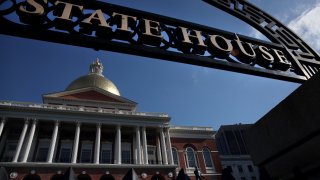
The Massachusetts House on Tuesday approved Boston Mayor Michelle Wu's proposed property tax rebalancing plan for the city after she agreed to scale back the changes.
The House voted 133 to 24 on the city's home rule petition, according to The Boston Globe, giving the Wu administration the power to temporarily shift the division of commercial and residential property taxes in response to projected economic upheaval.
WATCH ANYTIME FOR FREE
>Stream NBC10 Boston news for free, 24/7, wherever you are. |
Wu also said she will sign an executive order trimming the duration and scope of the tax shift, plus committing city dollars to offset impacts on small businesses.
The breakthrough in the House was a big boost for Wu's proposal, which had drawn criticism from business and real estate groups ahead of the July 31 end of formal legislative business for the term.
Get updates on what's happening in Boston to your inbox. Sign up for our >News Headlines newsletter.
"By mitigating a potential massive increase in residential property taxes, and by providing much needed support for our small businesses, this plan is a balanced approach that will allow the City of Boston to address any potential revenue issues, thus allowing the City to continue to thrive while weathering the imminent financial storms ahead," House Ways and Means Committee Chair Aaron Michlewitz, who represents Boston's North End, said in a statement.
Wu said the new plan "incorporates feedback received at the city and state levels."
House Democrats approved the home rule petition as drafted. The changes to shorten and reduce the shift will instead come later, via an executive order Wu agreed to issue.
Under state law, cities and towns can tax commercial and residential property at separate rates, and push the commercial rate as high as 175% of what a single, unified rate would have been.
The original proposal, which the City Council approved, would have allowed Boston to increase the maximum commercial shift to 200% and gradually reduce it back to 175% in the fifth year.
Wu said her future executive order will slash the maximum commercial shift to 190% and shorten the ramp-down timeline to three years instead of five. She also said it would direct the city's chief financial officer to seek appropriations of $15 million per year in each of those three years to support small businesses. According to Michlewitz, those "tax protections" will be limited to employers with 50 workers or fewer or an annual revenue of less than $5 million. The city will also move to expand a personal property tax exemption for small businesses.
"As Boston addresses economic shifts impacting cities around the country, it is imperative that residents in this far too expensive housing market are protected from drastic spikes in housing costs," Wu said in a statement. "And it is also critical for local small businesses to receive support and protection in this time of uncertainty."
"With these provisions to support small businesses and clarity on the scope and duration of this measure, Boston will effectively protect residents across every neighborhood and support our economy and local businesses," she added.
City officials have argued they need to gain the tax-shift power -- which hinges on state approval -- now in case a forecast decline in commercial real estate values materializes. If that happens, they say, homeowners could face a sudden, sharp increase in their property tax bills.
But business groups and real estate interests have argued that the changes could unnecessarily saddle employers with higher costs as they try to recover from the COVID-19 pandemic.
Tamara Small, CEO of the commercial real estate organization NAIOP, continued to criticize the proposal after Wu and House Democrats announced their agreement on changes.
"The commercial real estate community is facing unprecedented challenges with vacancies on the rise and an uncertain future," Small said in a statement. "NAIOP believes that this measure, if enacted, would be harmful to Boston's competitiveness. Recognizing the negative ripple effect that this proposal could have on the Commonwealth, NAIOP urges the Senate not to advance this legislation."
Marty Walz, the interim president at the Boston Municipal Research Bureau who had also expressed concerns about the tax-shift proposal, thanked Wu and Michlewitz "for listening to our concerns."
"While the Research Bureau is pleased to see changes to the initial proposal, these modest changes do not go as far as they should," Walz said. "The City of Boston has alternatives it should pursue, including slowing spending growth. If the proposal becomes law, there are numerous details to sort out, and we will work closely with Mayor Wu and the City Council as they craft their next steps."
The fate of the bill now rests with the Senate with only a day left in the legislative session. After July 31, legislative rules call for the House and Senate to meet in informal sessions only, when a single lawmaker's objection can stall any bill's progress, through the remainder of the term.



